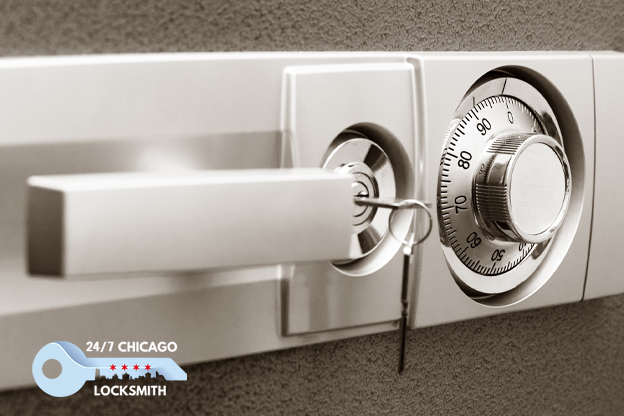Safes are essential pieces of equipment that help to protect valuable property in your home or business. However, to the average layperson, safes represent complicated and intricate pieces of machinery that might prove confusing. In this blog entry, the security experts here at Chicago Locksmiths will detail some of the important questions to ask yourself before purchasing a safe.
What will I be storing Inside the Safe?
Items that should be stored inside safes are tax records, estate plans, death/birth certificates, insurance documents, or any other documents you may need to access or revise. Additionally, guns or other weapons should be stored inside safes. Items like jewelry, rare coins, or other expensive items that you will NOT need to access regularly should be stored inside safety deposit boxes.
How much protection do you need?
Consider what types of potential attacks, disasters, or mitigations that your valued possessions might face, and buy the type of safe that protects them from these things. Fire-resistant safes, for example, help prevent documents, cash, or computer hardware/software from being destroyed – in fact, they protect items from temperatures of up to 1,500 degrees for a half an hour. However, electronic items need to be stored inside fire safes that boast an ability to maintain an internal temperature of under 125 degrees Fahrenheit.
What type of lock is necessary?
Choose between a combination lock, a biometric lock, and an electronic lock. Combination locks utilize mechanical components – usually a numbered wheel that is turned left/right in the proper sequence in order to open the safe. This is a reliable technology, but properly unlocking the safe may take some time.
Biometric locks read preprogrammed thumbprints (or even retina scans) of authorized individuals in order to grant access. Simply put your finger against the reader where it will be scanned, and it will be unlocked. These locks usually run on batteries and can accept a mechanical backup key in the event of a drained battery.
Electronic safes utilize light-up keypads to make entering the necessary code easier in dark light. It’s much faster to open electronic safes than mechanical safes – but it’s important to remember that they might be difficult to open in the event of drained batteries.

